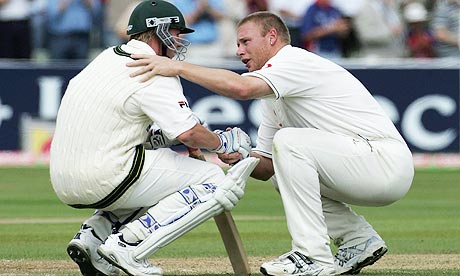There are no fairytales in sport," Steve Waugh said. He is probably right. But this week Andrew Flintoff will be doing all he can to prove him wrong.
We are in Tom Tully territory. Tully was the most prolific writer of Roy of the Rovers and all the tools of his trade are to hand. The old country is in disarray in pursuit of those coveted Ashes. Their hero is injured but he is going to play anyway. The team are falling apart and our man has just one last game against the dastardly Australians, who have finally found their form. Limping from the physio's couch comes our beloved gentle giant from Preston, the one who likes nothing more than to "share a few pints with me mates". You know the rest: a century, five wickets, Ashes won, hobbling hero carried from Oval outfield by his team-mates. Tears all round. Beers all round. Knighthood.
Flintoff has the stage, but he may not have the right script, if we are to believe Waugh. He was the craggiest of cricketers, yet he indulged in the most schmaltzy of farewells in the series against India in 2003-04. He wanted to end with a match-winning century at the SCG, his home ground. He finished at Sydney with an 80, a mistimed slog-sweep against Anil Kumble and a draw. Not bad, but not quite a fairytale.
Shane Warne, Glenn McGrath and Justin Langer went out gracefully, declining to announce their intentions to retire until after the 2006-07 Ashes series was settled. There was much hullabaloo in Sydney but England were so inept on that tour that no fairytale was possible for that trio either. The challenge was not there.
Ian Botham, with whom Flintoff is always compared (don't worry; it is a temptation that won't be resisted later on), petered out anonymously. He limped from the Test scene in 1992 – in every sense – after a defeat at Lord's against Pakistan and an inswinging yorker from Waqar Younis, which came to rest upon his big toe.
Apart from the Australians – and even they go out of their way to express their admiration and affection – there are very few people who would begrudge Flintoff a fairytale farewell at The Oval. Flintoff is a genuinely good bloke with many old-fashioned virtues. He is generous, as polite to paupers as he is to princes; he is loyal, he is brave and great company.
But he is definitely not just a simple lad from Preston, who likes "to share a few pints with me mates". If he was, we would not know of his imminent retirement. By announcing this on the eve of the Lord's Test Flintoff was ensuring that the media spotlight upon him would be at its brightest throughout the summer of 2009.
This might have been a constant hindrance to Andrew Strauss and the management team with an Ashes series to win. But Flintoff did it anyway. Perhaps he did so on the advice of his agent to enhance his earning capacity thereafter. But Flintoff is bright enough to say "No", if he wants to. In fact he is brighter than he likes to let on. He did not say "No".
Likewise, there was no compulsion for Flintoff to turn up at David Beckham's parties or to appear on the Jonathan Ross programme or to do all the things that A-list celebrities are expected to do post-2005, when he often had time to spare since he was in rehab of one sort of another. He does not have to have his own website. But he has chosen to take the high-profile route, which is fair enough, but it is a long way from pints with mates in Preston.
Moreover, Flintoff, even though he is about to retire from Test cricket, has just appointed his own press officer, Myles Hodgson, an old friend and a faithful ghost, to whom he displays typical loyalty. So this is all much more Beckham than Paul Scholes.
He is in danger of becoming an industry, when first and foremost he is a cricketer. For two years (2004-2005) he was a truly great cricketer. Let's rely on the bald statistics to start with. During those two years, when he played 27 Tests, he took 111 wickets and averaged 24.9 with the ball and 40 with the bat while scoring 1,607 runs, figures that brook no argument.
The simple, clinical way to assess the quality of an all-rounder is to compare batting and bowling averages. If the batting average is higher we have an all-rounder of the highest quality. During those two years Flintoff qualifies with ease. Over his Test career the figures are different. Currently he averages 32.59 with the ball, 32.06 with the bat. It would take a herculean performance at The Oval for the batting average to come out on top when the curtain falls.
Those figures remind us that there have been some ordinary times in the Flintoff career. He has always been bedevilled by injury. Assuming he is selected at The Oval he will end on 79 Tests. If he had played in every match since his debut against South Africa at Trent Bridge in 1998 he would have finished with 142 Test appearances. But it was not always injury that kept him out. Sometimes his form did not warrant a place.
In many ways Flintoff's career has been the reverse of Botham's. Botham started in a blaze of glory, grabbing a five-wicket haul in his first match and soon smashing centuries against all bar West Indies. Mortality did not really strike until 1982. But Flintoff tiptoed into Test cricket. It took him 13 Tests and three and a half years to register a 50, whereupon he went on to score his maiden Test century in Christchurch. He did not achieve a five-wicket haul until his 32nd Test in Bridgetown, five and a half years after his debut. Curiously, he has only two more to his name.
Their progress could not be more different and perhaps it was reflected by their waist size. In a nutshell, Botham started fit and got fat; Flintoff started fat and got fit. In both cases, however, the body inevitably began to rebel as the workload increased.
Flintoff lacked the finesse of Botham the batsman. Yes, Botham could be deft even if the memory more often has him thrashing away at Headingley. But it is in their bowling that the contrast is greater. Flintoff has just those three five-wicket hauls, Botham had 27. The simple explanation? Botham in his pomp moved the ball in the air consistently and at pace. Flintoff rarely did.
There were moments in 2005 when there was just enough reverse swing, which, allied to his speed through the air, had Australia groping. In the Caribbean the previous winter he intimidated West Indian batsmen from Brian Lara downwards. But against international batsmen of the modern helmeted era, sheer pace is rarely enough. Flintoff has always had to work damn hard for his wickets. He always had to pound the body and bowl fast to compensate for that lack of movement.
Nor was he quite as ruthless as Botham with the ball. There was real menace in Botham, rather than the pantomime snarl he adopted later in his thespian career, when he was roughing up tail-enders. They often quaked. Flintoff is not exactly friendly with the ball in his hands but he is incapable of exuding hatred. When he has a word, he cannot quite keep the smile from his face.
He has always been a softer character than his predecessor. Botham could be goaded into action. He could thrive amid conflict. Flintoff has always disliked conflict intensely. He functioned best under the "arm-round-the-shoulder" regime of Michael Vaughan rather than the "pull-your-bloody-finger-out-or-bugger-off" approach of Nasser Hussain.
In the long term the England captaincy did not sit easily upon his shoulders because he was reluctant to upset people. Like Botham he had modest success in charge of England, losing emphatically to the best team in the world. Like Botham he was amenable to the odd drink. But they share many more positive qualities.
At the top of the list is their fearlessness as cricketers. Both were galvanised by the challenge; rather than shrink at the critical moment they surged forward, eager to have the ball or bat in their hands when the match was to be decided. They would never be paralysed by the fear of failure and humiliation. They were always brave enough to have a go.
Both would dominate a dressing room, though Flintoff might do it more quietly. At Headingley England did not just miss Flintoff on the field. The big men can defuse the tension in the dressing room and give confidence to more timid souls with a word, a quip, or just a glance. Botham and Flintoff were generous enough to do that for lesser cricketers.
We will all miss him when he retires – fans, team-mates, opponents and, indeed, pressmen. When confronted with a blank screen and with inspiration running late, I have often looked to an esteemed colleague for guidance of how to start. "If in doubt," he says, "I always turn to two words, which are bound to keep them happy in the office: 'Freddie Flintoff ...'"
Oddly, the images of Flintoff that stick are not of him in action, but in the aftermath of victory. There he is whirling his one-day shirt around in Mumbai in 2002, displaying elation and rather a lot of puppy fat. At Edgbaston in 2005 the hand is on Brett Lee's shoulder and, even if he is blaring "1-1" into the paceman's ear as he now jokes in his after-dinner routine, the picture still speaks of Flintoff's compassion. Then there are the scenes of schoolboy drunkenness at Trafalgar Square and Downing Street, which only he could get away with because he is Freddie.
We await one last image at The Oval – in the wild hope that it will be inspired by Hans Christian Andersen.











